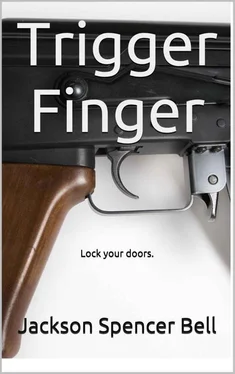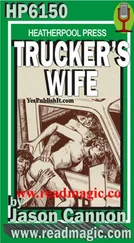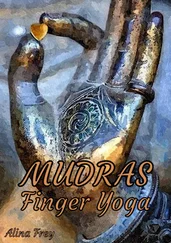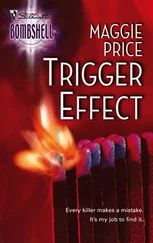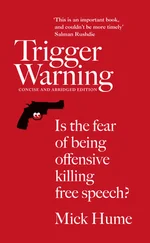I am a gun owner, I thought.
And not just any gun, either. Inside the LEC, I’d mentioned to the deputy that the weapon looked familiar, and he said I’d probably seen it in the movies. It was a Kalashnikov AK-47, he told me, Russian manufacture, which made it more valuable. That’s a bad-ass piece of hardware, buddy. Staring down at it, I reflected that it was indeed bad-ass, but also wholly unnecessary. Not just to me, but to anyone; I’d long felt that the government needed to ban these things. I voted for people who wanted to eliminate weapons like this from American households. Yet now I not only had an assault rifle in my trunk, but I’d bought a case and lock for it. Evidently, I planned on keeping it, which made no sense because I was not and had never been an AK-47 kind of guy. I stared down at the weapon and I thought to myself, why are you doing this?
And the answer came: I don’t know.
No, I didn’t know. At the time, I would have said—as I said to Allie—that I wanted to humor my ailing father and that I wanted to hold onto it until Bobby got back from Iraq. But I never turned it over to Bobby, and after my father died, I didn’t sell it, pawn it or do any of those other things people might do with unwanted property. By this point, I had bought a safe for it, and I had bought ammunition. Publicly, I continued to vote Democratic and joke about right-wing lunatics, all the while saying nothing about the little secret in my basement. On some level, I believed my father’s warnings. Evil existed. It had claws. And someday, it would try to get me.
He’d been right.
And the Bald Man, whoever the hell he was, had been right, too. That I just happened to have an AK-47 down in my basement seemed like an incredible coincidence. Had I seen it in a movie, I’d have said yeah, right , because it didn’t seem believable. Guys like me normally didn’t even own guns, let alone Soviet military hardware. No one understood that better than I. When you added all the truths of my life and personality, the math said that I shouldn’t have had a firearm the night those two yahoos attacked my home.
The implications of this truth haunted me as I sat on the couch in Dr. Koenig’s office, pondering what would have happened had I refused the gun. Pinnix and Ramseur would have gotten upstairs.
Rape.
Murder.
I shivered.
“Did the caller scare you?” Dr. Koenig asked.
“Yes,” I answered.
I had told him about the radio show and the Bald Man. Now I told him about the rifle, how I’d come to own it and how such a thin little thing had made a difference between life and death. My mind kept returning to this— these, actually, because so many thin little things had determined the outcome of that night. Remove any one of them…
“I think what’s happening in my nightmares,” I said, “is I’m re-living the experience. I’m trying to assure myself that I would have prevailed no matter what, so my brain’s in there running these little what-if productions and trying to work out ways I could still come out on top. During the day, I think about it all the time because my brain is training for the next time it happens.”
Dr. Koenig shifted in his seat. The sun had warmed his office to the point where he’d found it necessary to roll up his shirtsleeves and loosen his tie. Fashionably rumpled; Steve Jobs would have approved. He looked up at me and canted his head to one side, his mouth an unreadable line. I had come to understand that this was his way of telling me to elaborate, because I had said something that interested him.
“And I feel like it is going to happen again,” I said. “Or it could.”
“Because of the caller,” Dr. Koenig said. “The one who calls himself the Bald Man.”
“Yes.”
I wanted to tell him about what Ruby had said at the flea market back in 1989. But how do you discuss such things by the light of day? I had the strong suspicion that if I started talking about redneck psychics and what they may or may not have foretold, Dr. Koenig would have called the men in white coats to come and take me away.
“You’re afraid of him,” he observed.
I nodded. “Crazy people are scary.”
“Why do you think he refers to himself as the Bald Man?”
Because 23 years ago, a old psychic who looked like a strip of beef jerky threw me out of her trailer right before telling me to look out for him. “I don’t know, maybe because he’s bald. You’re bald, by the way.”
“I don’t listen to Billy Horton.”
“Didn’t figure you did.”
I rubbed my forehead, looking down. The coffee table looked back up at me with its crappy veneer trying and failing to conceal that fiberboard core. I wondered what the Chinese who manufactured garbage like this said when they packed it into boxes and sent it off to the discount stores. The Americans are a shallow people, they probably said. Look at what they want, look at what they buy. It’s not wood, they know it’s not wood and yet they don’t care. It doesn’t matter to them that it’s really only sawdust and glue sandwiched between sheets of photo-etched plastic. It’s cheap. That’s all they want.
“Do you think you’ve encountered this man before?”
I looked up. “No. I know a lot of bald guys, but none of them would call me out on the damn radio. You want to know what I really think? I think I’m suffering from post-traumatic stress disorder.”
“What did these guys look like, Pinnix and Ramseur, the men who broke into your house?”
I blinked. I looked towards the window, then down at my issue of Southern Rifleman. “Um… they were black—African American, I mean.”
“Tall, short, fat, skinny? Thick lips, thin lips, big noses, small noses, scars, facial hair, who are we talking about, here? If you hadn’t shot them, if they’d run off into the woods, what would you have told the police to differentiate them from any other black guys?”
No one had ever asked me that before. What did they look like ? The police hadn’t asked, because they’d seen the bodies. The reporters hadn’t asked, Allie and Abby hadn’t asked, Craig Montero hadn’t asked, Tom Spicer hadn’t asked. So I hadn’t considered it. As many times as I’d re-lived that shooting in my mind, I had never examined their faces. I hadn’t needed to.
But now Dr. Koenig wanted me to describe them and I drew a blank.
“I don’t know,” I said. “I can’t see their faces. I’m sitting here trying to remember and I just… can’t. I can see bodies lying in the hallway, I can see myself shooting at them, but no faces. What do you think that means?”
He recrossed his legs.
“You tell me.”
I looked at the window. Outside, the sun shone down on a concrete bench, the kind you see in graveyards with nobody sitting on them. The bench stood between two adolescent trees. Dogwoods, I thought. Or Eastern redbud. Without flowers, I couldn’t tell which.
“Why don’t we do a little exercise?” Dr. Koenig asked.
“What kind of exercise?”
“Why don’t you tell me what you do remember?”
And so I did.
“I was down in the basement,” I began, “watching the Carolina-Virginia Tech basketball game.”
Get up.
When I first regained consciousness, I perceived only pain. Fresh agony detonated in my head with each heartbeat. Lightning bolts flashed across my skull, only unlike real lightning, these struck in the same place every time. When they did, the colors on the backs of my eyelids pulsed and changed.
My first thought, in my own voice: I’m blind.
The second, delivered in Bobby’s: get up.
Читать дальше
